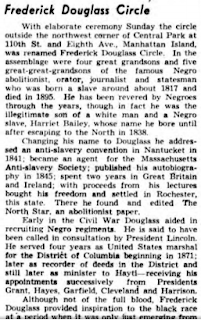After a march down from Harlem, an amalgam of notables and noticers gathered at the newly renamed circle at the northernmost corner of Central Park. An announcer calls the crowd to order and starts the formal dedication. There would be a series of civic speakers, all charged to give brief comments. No invocation was called for, but the emcee, maybe unconsciously, gave a nod to the religious life of the community when he introduced the first speaker on queue, Bishop Lawson, one of Harlem's most recognizable voices.
By 1950, Lawson had become a fixture on the radio (along with his wife Carrie, the "Praying Mother of the Air," now two years interred). He had arrived in Harlem in his 30s, to a water plug and a unexpecting prayer band. This day, before a microphone and about a thousand onlookers, stood a man in his 60s, called upon to set the tone and give voice to the cheer that prevailed among Harlemites that day.
Today, Lawson's most enduring legacy is the church organization that grew from his evangelistic efforts. During Lawson's lifetime, however, he was known to be involved in various aspects of the local, national, and internaional life of his people. He was a Pan-Africanist, supporting Ethiopian independence with an eye toward the liberation of all African people. He ran a summer colony upstate for acquaintances that found vacationing an exercise in avoiding closed doors. He was a civil rights leader, inviting politicians to come uptown to address the people they represented downtown, in Albany, and in Washington.
Above all, however, he was a preacher, a most revered profession in his day. His stature among the preachers of Harlem is such that even Langston Hughes, one of Harlem's most published writers (and a resigned agnostic-atheist), mentions him more than once as one of Harlem's principal preachers. One of his most popular characters, Jesse B. Simple, refers to Lawson in an attempt to prove his devoutness to a friend:
"I have been baptized... also anointed with oil. When I were a child I come through at the mourners' bench. I was converted. I have listened to Daddy Grace, et with Father Divine, moaned with Elder Lawson and prayed with Adam Powell" (The Early Simple Stories, p. 44).Each reference here intends to peg each minister according to popular opinion: e.g., Father Divine's feasts, Adam Powell Jr.'s lack of airs (notice no title). 'Moaning' with Lawson quite directly refers to the emotional services Refuge Church of Christ was known for, broadcast by air for any to hear.
But today he was not here praying, preaching, or singing. Instead he was standing for, speaking for Harlem, that teeming mecca of aspirants and strivers. His remarks were met with showers of applause. A scriptural reference about the king that forgot to honor Mordecai was pretzeled into a compliment to the committee that worked so dutifully not to let Frederick Douglass go unremembered. The remarks of Lawson and others must have been a well received by Douglass's descendants, who were present for the occasion, the recording of which makes for a warm momento of old Harlem to historical enthusiasts today.

No comments:
Post a Comment